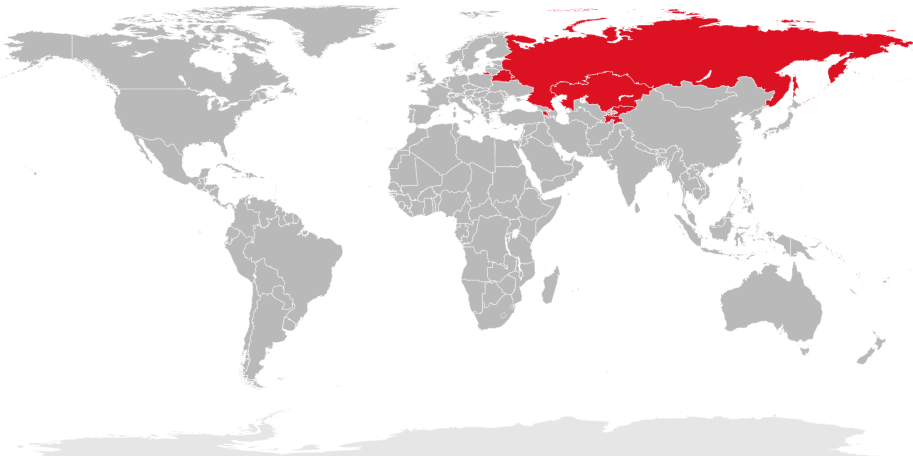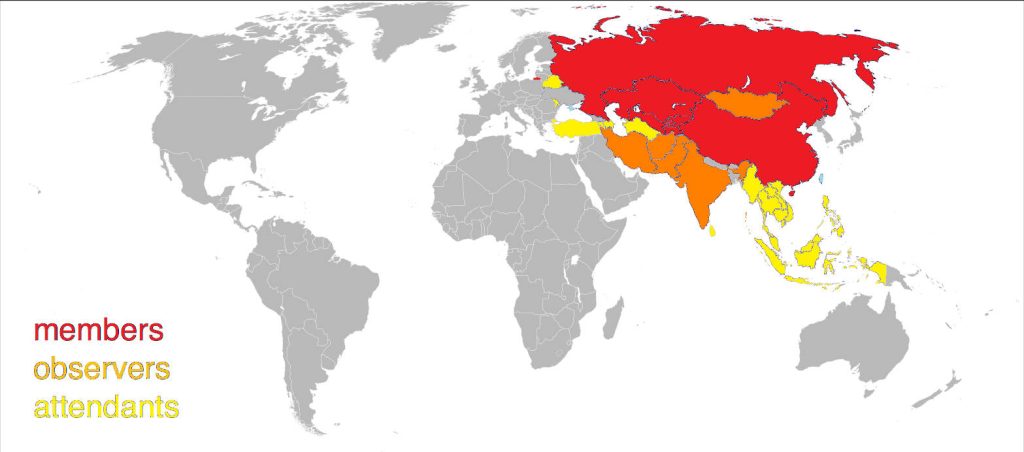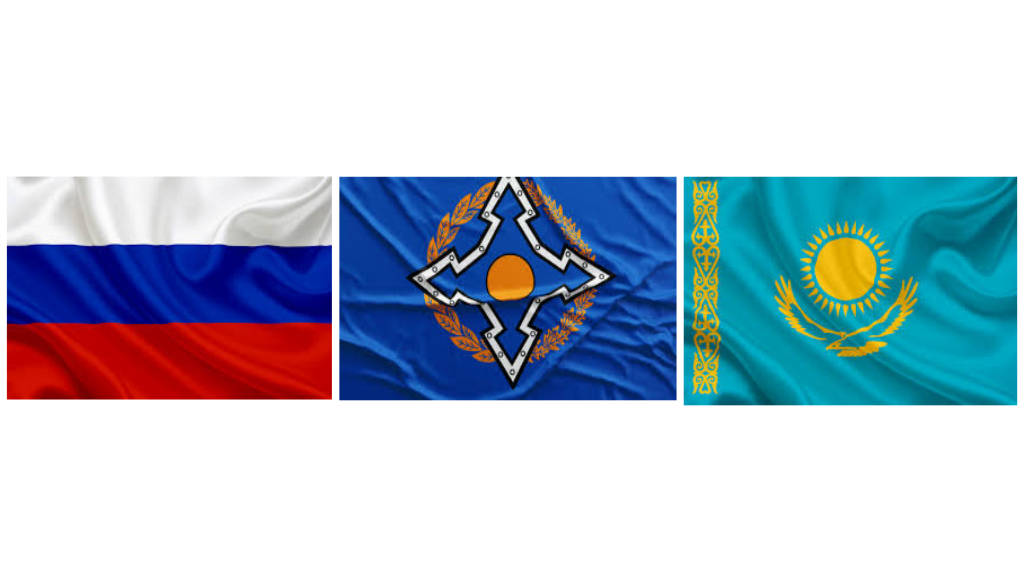
The Russian Foreign Minister, Sergey Lavrov, has been in Astana, Kazakhstan, meeting with the Kazakh President Kassym-Jomart Tokayev, and the Foreign Minister Murat Nurtleu. Following these meetings, Lavrov held a press conference during which he discussed several issues relating to a planned visit by President Putin to attend the Collective Security Treaty Organisation (CSTO), as well as matters of bilateral trade and security. The CSTO is Eurasia’s equivalent to NATO.
The Collective Security Treaty Organisation (CSTO)

This is what he had to say, with our comments following:
Lavrov: “We are in the Republic of Kazakhstan on an official visit. Detailed talks have been held with Foreign Minister of the Republic of Kazakhstan Murat Nurtleu. I have just had a long meeting with President of Kazakhstan Kassym-Jomart Tokayev. We discussed preparations for a state visit by President Putin to Astana on November 27, 2024 on the eve of a summit of the CSTO member states, which will be held in the capital of Kazakhstan. We noted that several dozen documents, including statements by the leaders and sector-specific intergovernmental and interagency agreements in various areas of our alliance and strategic partnership with Kazakhstan, were thoroughly prepared.
We focused in particular on the prospects of cooperation in the integration agencies within the Eurasian space such as the CSTO, the EAEU, the CIS and the SCO. We share the understanding of the importance of making a wider use of the potential offered by these organisations in order to build a Greater Eurasian partnership in the economy, investment, and transport, as well as logistics and to use this foundation to promote the principles of comprehensive pan-continental Eurasian security architecture.”
RPA: Lavrov emphasizes cooperation here between the CSTO, a security organisation comprising Russia, Armenia, Belarus, Kazakhstan, Kyrgyzstan and Tajikistan, together with the trade organisations of the Commonwealth of Independent States (CIS), the Eurasian Economic Union (EAEU) and the Shanghai Cooperation Organisation (SCO). It should be noted that Armenia is deciding whether or not to continue as part of the CSTO. Nevertheless, while the CIS and EAEU represent the trade aspects of a very similar Eurasian grouping, the SCO is a far wider organisation with a membership that also includes China, India, and Iran, Pakistan and has numerous participants in the Middle East and South Asia. It is also involved in regional security as well as trade and related activities. This implies greater regional ties are being developed between members of the CIS and SCO; this would cover a region including Eurasian with ties throughout Asia, South Asia and the Middle East. In short, the potential development of a huge security architecture to rival NATO in the east.
The Shanghai Cooperation Organisation

Lavrov: “We discussed continued coordination of our actions in the UN and the OSCE, with the latter going through a deep crisis. Our positions overlap on the overwhelming majority of the topics that came under discussion today. We will continue to coordinate our bilateral and multilateral agenda.”
The Foreign Minister then took media questions. These related to general statements concerning Russia-Kazakh trade, the building of a nuclear power plant, the situation in Ukraine, and the election of Donald Trump as new President of the United States. As follows:
Q: “Deputy Foreign Minister of Kazakhstan Roman Vasilenko stated recently that there were no issues in Astana-Moscow bilateral relations, but there were “a number of questions.” Do you agree with this? What does Moscow think could be the “questions” in bilateral relations?”
Lavrov: “No questions in bilateral relations means there are no relations whatsoever. Extensive bilateral agendas call for providing many practical and specific answers to existing questions. This is exactly the kind of relations we are pursuing with our friendly ally, the Republic of Kazakhstan.
Practical questions do arise occasionally. In particular, we are looking for ways to expand economic, financial, trade and investment ties and to protect them from illegal unilateral sanctions imposed by the United States and the collective West. This is a vast bloc of questions which our respective economic, trade and financial agencies and central banks are busy addressing. The solutions that our colleagues from these agencies identify help us step up the pace of economic cooperation and expand trade, to make sure Kazakhstani enterprises and Russian economic operators, as well the budgets of the two countries, benefit from it. This is the most urgent bloc of issues we are dealing with at this point.
We are discussing humanitarian cooperation issues as well. Both Kazakhstan and Russia are addressing topics related to the common historical past and the present. I would like to point out the creation of a joint group of historians, which is the most recent positive agreement and a useful step forward which will help cool down the passions that occasionally flare up in certain segments of our respective societies. This is another topic that is being worked through by mutual agreement and on a mutually respectful basis.
With regard to cultural and humanitarian, as well as educational ties, there are questions, as President of Kazakhstan Tokayev put it, related to “creating the points of Russian culture.” In this context, we discussed the creation of three jointly managed schools in Kazakhstan which will provide education in the Russian language. In turn, our Kazakhstani friends are interested in creating similar schools teaching the Kazakh language in a number of Russian cities, such as Orenburg, Omsk, and Astrakhan. All of that represents positive processes. The more such questions arise, the more decisions will be taken to address them, which will strengthen our alliance.”
Q: “Kazakhstan plans to build a nuclear power plant. Is Russia ready to help do this? Was this issue discussed at the talks today?”
Lavrov: “Russia is not just ready to help but has already submitted its proposals. We monitored the referendum held by President of Kazakhstan Kassym-Jomart Tokayev, during which the people supported his plans for the development of nuclear power generation.
The State Atomic Energy Corporation Rosatom is willing to provide its competence to address this issue jointly with our Kazakh friends. We are also ready to cooperate with the relevant agencies and organisations of other states.”
Q: “The President of Kazakhstan Kassym-Jomart Tokayev has met with German Chancellor Olaf Scholz and President of France Emmanuel Macron, who mentioned the Ukraine conflict during their conversations. The Foreign Ministry of Kazakhstan has recently hinted again that the country was willing to act as an intermediary in the Ukraine dispute. What does Moscow think about Kazakhstan’s contacts on this track and its ability to act as an intermediary or otherwise contribute to a settlement in Ukraine?”
Lavrov: “On September 27, Kazakhstan attended a meeting of the Friends for Peace group on the Ukraine crisis held at the initiative of China and Brazil in New York. We welcomed the fact that the Global South and East, that is, the World Majority, had joined forces to advocate fair agreements that could help eliminate the root cause of the Ukraine crisis and restore peace there.
I would like to note that President of China Xi Jinping advanced a global security initiative in February 2023. It was not focused on any particular crisis but on all the principles that should be applied to settle conflicts anywhere in the world. One of its key provisions is exploring and eliminating the root causes of crises.
We believe that our colleagues in the Friends for Peace group on the Ukraine crisis will act in strict compliance with that principle. This is logical, because stability and security can hardly be restored without eliminating the root causes of crises.
It is a fact that among the root causes are NATO’s continued eastward expansion contrary to their commitments, including in writing, and the Kiev regime’s elimination of everything Russian – the Russian language, education, culture and media – in accordance with the laws adopted after the February 2014 state coup. The latest example is the law prohibiting the canonical Russian Orthodox Church.
Our partners are fully aware of the root cause of the problem. We will carry on our dialogue, and we welcome Kazakhstan’s contribution to the efforts to develop a serious coalition focused on creating conditions for the settlement of the abovementioned problems.”
RPA: The “Friends of Peace” group includes Brazil, China, South Africa, Algeria, Bolivia, Kazakhstan, Colombia, Egypt, Indonesia, Mexico, Kenya, Turkey, and Zambia. All are BRICS or BRICS-friendly countries. Their collective voice has been generally ignored by the West.
Q: “Experts suggest that European leaders may begin deliberations on a new strategy for addressing the Ukraine crisis at the forthcoming EU summit in Brussels on November 7−8. Do you consider Donald Trump’s election to be a “cold shower” for the EU leaders, or is it futile to anticipate any shifts in foreign policy?”
Lavrov: “I am not in a position to speculate on the sentiments within the EU. Whether this shower proves to be cold, hot, or even scalding, I cannot say. The EU’s complete reliance on the Brussels bureaucracy, which seeks to dominate processes in a manner reminiscent of the most autocratic (as they say) of systems, is evident. This extends not only to foreign policy but also to the EU’s own developmental trajectory. I have no intention of venturing guesses about this. Should there be pragmatic, sensible proposals, we stand ready to consider them. Thus far, from Brussels and other capitals of what they term “United Europe,” we hear only mantras about the lack of alternatives to what they call “Mr Zelensky’s formula,” which seems to lead to a cul-de-sac.
I am convinced that many politicians with common sense recognise this, yet they find themselves unable to retreat from their original stance of unwavering support for Ukraine, which they claim embodies “European values.”
We have yet to receive any response to our inquiries on how the prohibition of the Russian language and the Ukrainian Orthodox Church aligns with “European values.” It appears to me that Europeans ought to introspect on the European authenticity of the “values” advanced by Mr Zelensky’s regime. If that is indeed the case, what do these “European values” truly represent, and where are they steering the societies of the EU member states?”
Q: “Considering Donald Trump’s victory, are there any scheduled engagements with representatives of the forthcoming US administration? In this context, do you foresee a change in the US Ambassador to Russia? When might we expect a reciprocal decision from Russia regarding a new Ambassador in Washington?”
Lavrov: “We have never turned away from engaging with any party. Russian President Vladimir Putin consistently underscores our stance: dialogue is invariably preferable to mutual isolation.
The challenges in Russia-US relations are profound. They arise from the perception within the US elite that suppressing any global competitors is imperative to maintaining American predominance. Under current conditions, this perspective is increasingly unjustifiable, given the objective evolution of global affairs. Nonetheless, this ideology persists among the Americans.
I reiterate: we did not sever relations, nor is it our place to propose their resumption. Should there be an initiative to engage in honest discussions, devoid of unilateral demands, about our current standing and future direction, we will be more than willing to partake.
As for the ambassadors, I anticipate that the incoming American Republican administration will be keen to appoint a new Ambassador. We will not impose any impediments. The appointment of a new Russian Ambassador to the United States is proceeding as usual. The necessary procedures will soon be completed, and we shall keep you informed.”
Further Reading
Russia – Kazakhstan 2024 Bilateral Relations: Update

 Русский
Русский













